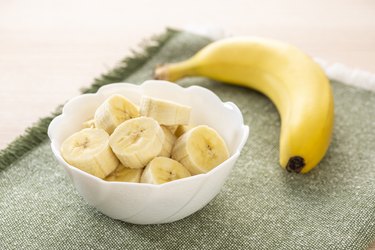
In general, most fruits contain little iron -- a nutrient needed to make proteins in your muscles and blood. Bananas are no exception. However, they are loaded with plenty of other beneficial nutrients. As long as you meet your iron requirements by eating other iron-rich foods, you can still include bananas -- in moderation -- in your diet, despite the fact they are low-iron foods.
Iron in Bananas
Video of the Day
The U.S. Department of Agriculture's National Nutrient Database for Standard Reference reports that an extra-small banana contains about 0.21 grams of iron, while a medium-sized banana provides 0.31 grams of iron. Even an extra-large-sized banana that is 9 inches or longer only contains 0.4 grams of or iron. This low amount of iron found in bananas is not enough to meet your daily iron requirements.
Video of the Day
Daily Iron Needs
Your daily iron needs are based on your age and gender. The Office of Dietary Supplements reports that the recommended dietary allowance -- or RDA -- for iron is 8 milligrams daily for men, 8 milligrams for women over age 50, 18 milligrams per day for non-pregnant, non-nursing women ages 19 to 50, 27 milligrams during pregnancy and 9 milligrams or iron daily for breastfeeding women.
Other Beneficial Nutrients
Though low in iron, bananas can help you meet your total carbohydrate, fiber and potassium requirements. The USDA reports that one medium-sized banana provides you with about 27 grams of total carbs – including 3 grams of fiber – and 422 milligrams of potassium. You should get about 45 to 65 percent of your daily calories from carbohydrates. Most women need 25 grams of fiber daily, while men should aim for 38 grams a day, according to the Dietary Guidelines for Americans 2010. Potassium needs for adult men and women, including pregnant women, are 4,700 milligrams daily -- while breastfeeding women require 5,100 milligrams of potassium a day, notes the Institute of Medicine.
Iron-Rich Alternatives
Regardless of whether or not you eat bananas, making sure you consume at least some iron-rich foods each day helps ensure you meet your daily iron requirements. Red meat, seafood and poultry provide iron that is easily absorbed by your body. Plant-based, iron-rich foods include iron-fortified breakfast cereals, raisins, legumes -- especially soybeans -- and spinach. If you're pregnant or may become pregnant, ask your doctor if iron supplementation is appropriate for you.
- U.S. Department of Agriculture National Nutrient Database for Standard Reference: Basic Report: 09040, Bananas, Raw
- Office of Dietary Supplements: Iron
- U.S. Department of Agriculture, U.S. Department of Health and Human Services: Dietary Guidelines for Americans 2010
- Institute of Medicine: Dietary Reference Intakes (DRIs): Recommended Dietary Allowances and Adequate Intakes, Elements